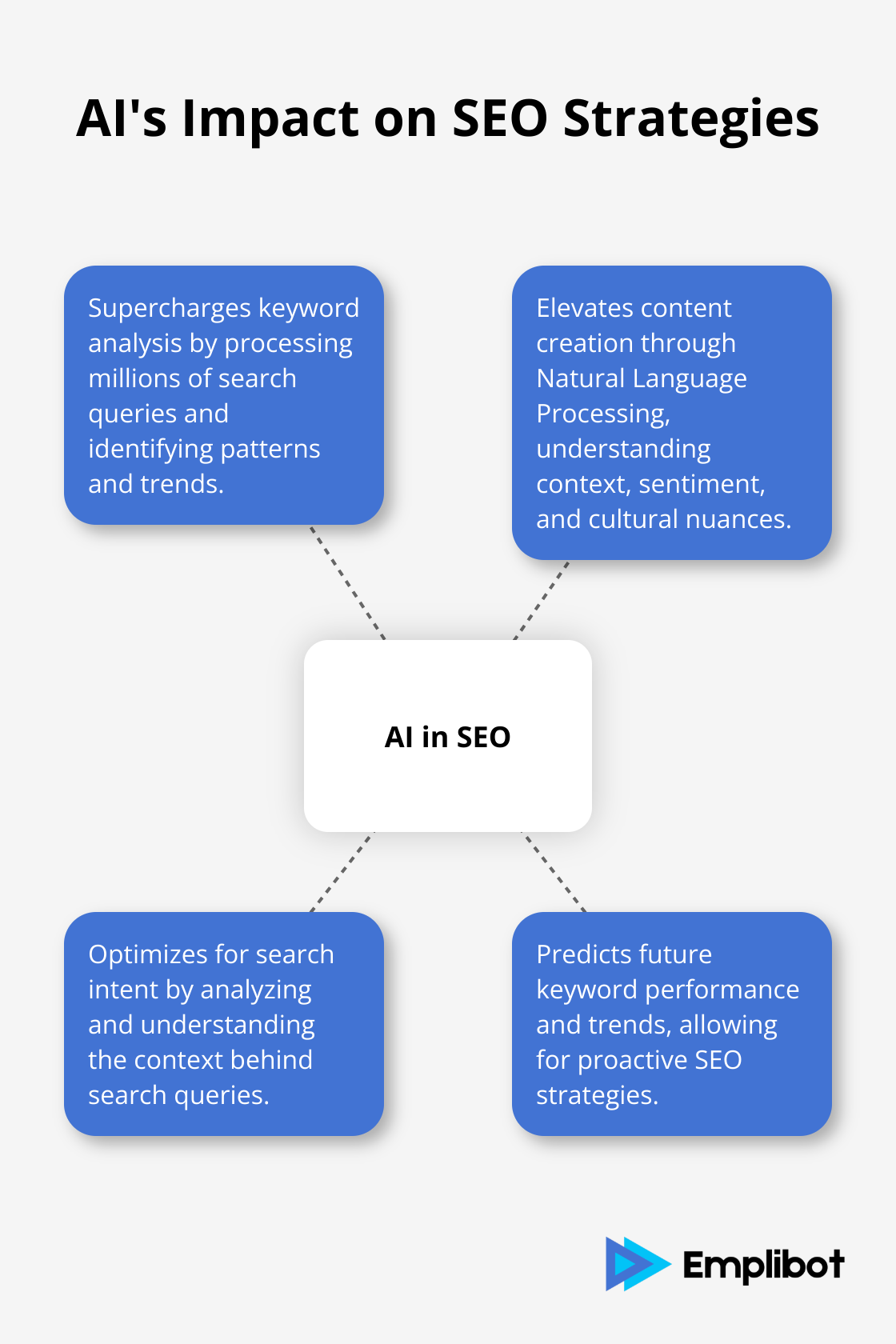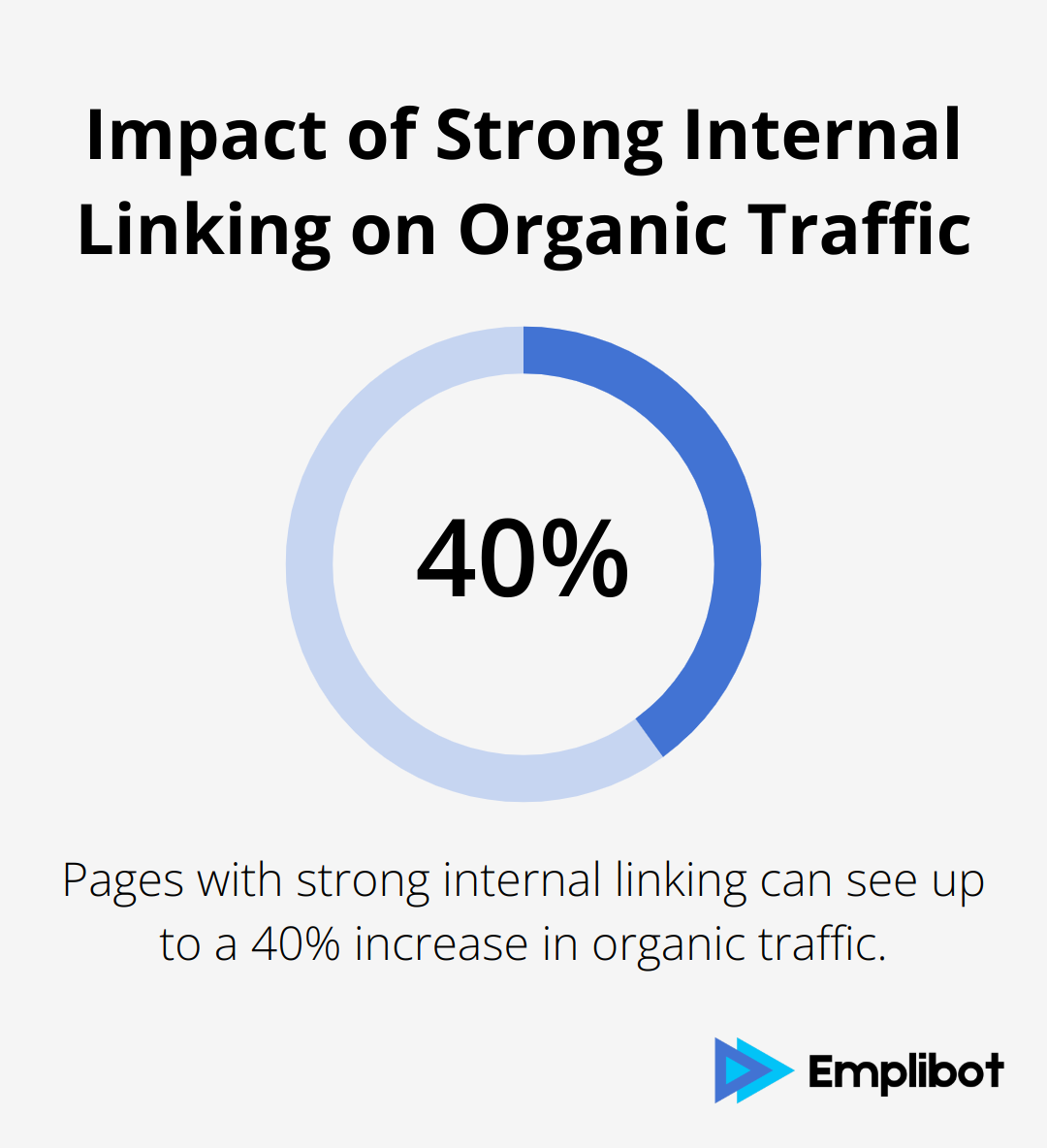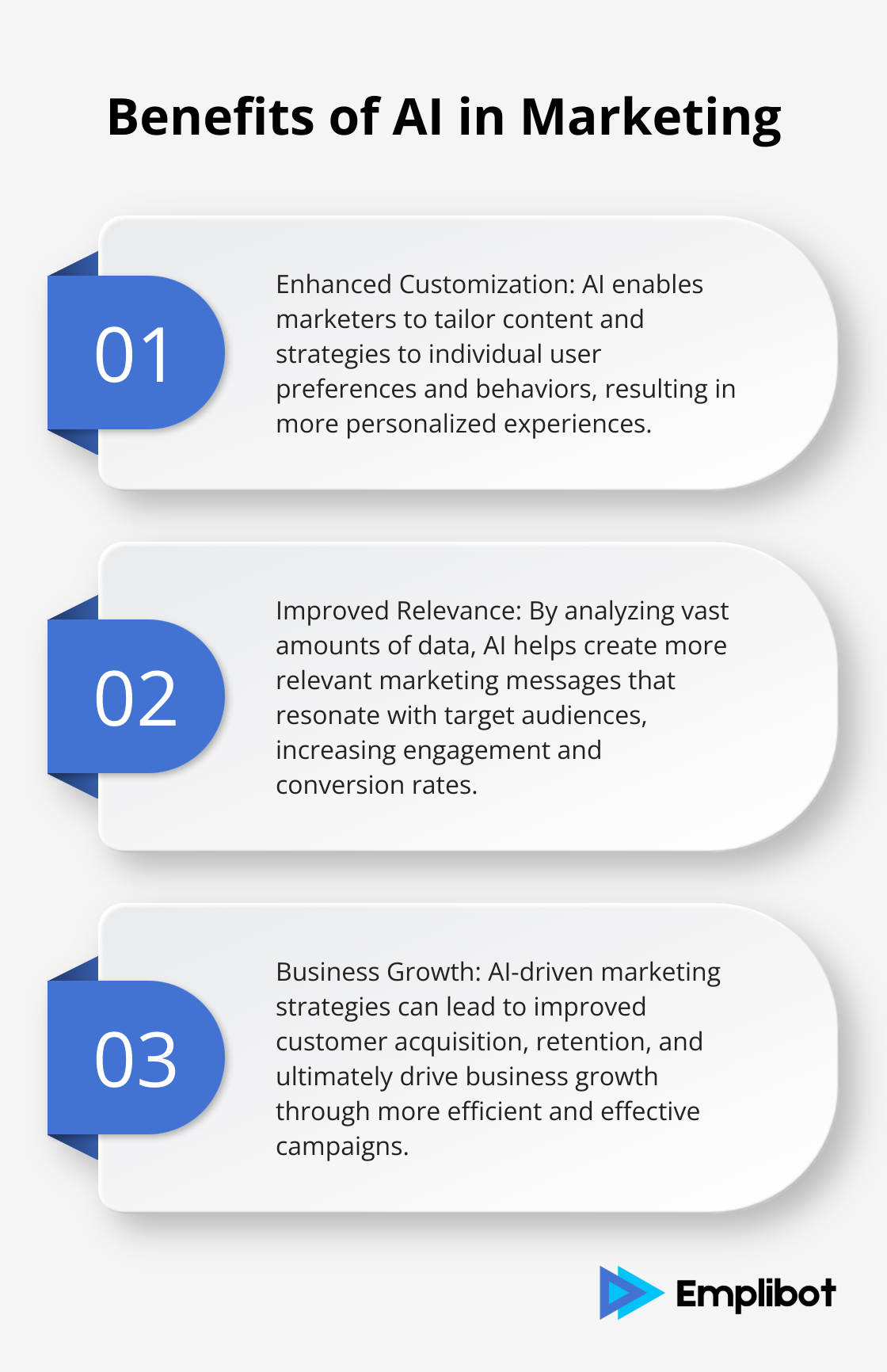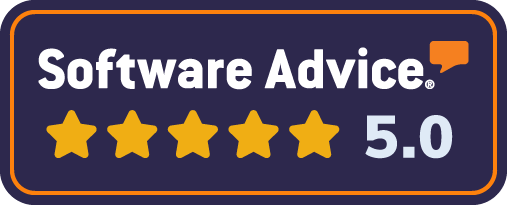At Emplibot, we’ve witnessed the revolutionary impact of AI on SEO firsthand. The landscape of search engine optimization is rapidly evolving, with artificial intelligence at the forefront of this transformation.
In this post, we’ll explore concrete examples of AI in SEO, showcasing how these technologies are reshaping the way we approach digital marketing. From keyword research to competitor analysis, AI is setting new standards for efficiency and effectiveness in the SEO world.
Contents
ToggleHow AI Revolutionizes Keyword Research and Content Creation
AI has fundamentally changed our approach to keyword research and content creation in SEO. The days of manual, time-consuming processes are over. AI-powered tools now analyze vast amounts of data in seconds, providing insights that were previously unattainable.
Supercharging Keyword Analysis
AI algorithms process millions of search queries, identifying patterns and trends that human analysts might miss. These tools don’t just look at search volume; they consider factors like search intent, seasonality, and even predict future keyword performance. Semrush analyzed 10M+ keywords to uncover how Google’s AI Overviews are reshaping SEO, providing insights into what’s changing and what strategies to adopt next.
Natural Language Processing for Content Ideation
Natural Language Processing (NLP) has elevated content ideation to new heights. AI now understands context, sentiment, and even cultural nuances in search queries. This allows for the creation of content that truly resonates with the target audience.

AI-Powered Content Creation
AI doesn’t just assist with research; it actively participates in content creation. Advanced language models can now generate human-like text, craft compelling headlines, and even structure articles for maximum engagement. This technology (which continues to evolve rapidly) allows businesses to produce high-quality content at scale, meeting the ever-increasing demand for fresh, relevant information.
Optimizing for Search Intent
One of AI’s most significant contributions to SEO is its ability to analyze and optimize for search intent. By understanding the context behind search queries, AI tools can help create content that precisely matches what users are looking for. This leads to higher rankings, increased click-through rates, and improved user satisfaction.
As we move forward, the integration of AI in keyword research and content creation will only deepen. The next frontier lies in the realm of internal linking and social media conversion, where AI is set to make equally impressive strides.
How AI Enhances Internal Linking and Social Media Reach
AI-Powered Internal Linking Strategies
AI algorithms have transformed internal linking practices. These advanced systems analyze entire website content, understanding the relationships between different pages and posts. This deep comprehension allows for the creation of a more logical and user-friendly site structure.
AI identifies relevant internal linking opportunities that human editors might overlook. It suggests links based on semantic relevance, not just keyword matches, ensuring that users find truly related content. This improves user experience and helps search engines better understand your site’s structure and content hierarchy.
A study by Ahrefs found that pages with a strong internal linking structure can see up to a 40% increase in organic traffic. This statistic underscores the importance of a well-thought-out internal linking strategy (which AI can help optimize).

Automated Blog-to-Social Media Conversion
One of the most exciting developments in AI for SEO is the ability to automatically transform blog posts into engaging social media content. This process, which used to take hours of manual work, can now be completed in minutes with AI.
AI tools analyze your blog post, extract the most important and engaging points, and create social media-friendly versions tailored for different platforms. For instance, it can generate a thread for Twitter, a carousel for Instagram, or a concise post for LinkedIn, all from a single blog article.
This capability is particularly valuable given that social signals are increasingly important for SEO. By leveraging AI to efficiently repurpose blog content for social media, businesses can significantly amplify their reach and improve their SEO performance.
Personalized Content Distribution
AI doesn’t just convert content; it optimizes it for each platform and audience. It analyzes engagement patterns, user preferences, and platform-specific trends to tailor the content for maximum impact. This level of personalization can lead to higher engagement rates, more shares, and ultimately, better SEO results.
For instance, AI can determine the best times to post on different social media platforms based on when your audience is most active. It can also suggest hashtags and mentions that are likely to increase your content’s visibility.
The impact of AI on internal linking and social media conversion is profound. These advancements are not just making SEO more efficient; they’re opening up new possibilities for creating interconnected, engaging content across multiple platforms. As we move forward, we’ll explore how AI is transforming topic clustering and competitor analysis, further revolutionizing SEO strategies.
AI-Driven Topic Clustering and Competitor Insights
Transforming Content Strategy with AI Topic Clusters
AI has revolutionized the process of topic cluster creation. Advanced algorithms analyze vast amounts of content across the web, identifying relationships between topics that humans might miss. This results in more comprehensive and interconnected content strategies.
AI tools can process thousands of articles in your industry, mapping out topic relationships and suggesting cluster structures. This not only saves time but also uncovers valuable content opportunities. AI and keyword clustering demonstrate tangible benefits for SEO strategy, as real-world examples have shown.
These AI systems understand context, user intent, and semantic relationships between topics. This leads to more nuanced and effective content strategies that resonate with your audience and search engines alike.
Leveraging Machine Learning for Competitor Tracking
AI has transformed competitor tracking into an automated, real-time process. Machine learning algorithms continuously monitor competitor websites, social media profiles, and online presence, providing instant alerts on significant changes or new strategies.
These systems track everything from content updates and keyword targeting to backlink acquisition and social media engagement. They don’t just collect data; they analyze it, providing actionable insights that can inform your SEO strategy.
AI tools can identify when a competitor starts targeting a new keyword cluster, allowing you to react quickly. They also analyze the performance of competitor content, helping you understand what resonates with your shared audience.
AI is an opportunity to offer more customized and relevant marketing to customers and ultimately drive businesses forward.

Streamlining Backlink Analysis for Strategic Link Building
AI has revolutionized backlink analysis, turning it from a laborious task into a streamlined, data-driven process. These tools can analyze millions of backlinks in minutes, identifying patterns and opportunities that would take humans days or weeks to uncover.
AI-powered backlink analysis evaluates the quality and relevance of backlinks, identifies potential link-building opportunities, and even predicts which outreach strategies are likely to be most effective.
AI can analyze your competitors’ backlink profiles, identifying high-value links that you don’t have. It can then suggest similar websites or content types that might be receptive to your outreach.
The power of AI in topic clustering, competitor tracking, and backlink analysis is undeniable. These tools are not just making SEO professionals more efficient; they’re uncovering insights and opportunities that were previously invisible. (As AI continues to evolve, we can expect even more sophisticated and powerful tools to emerge, further transforming the landscape of SEO.)
Wrapping Up
AI has transformed SEO practices, revolutionizing every aspect from keyword research to competitor analysis. These examples of AI in SEO demonstrate its power to enhance efficiency, uncover hidden insights, and drive better results. AI-powered tools have redefined keyword research, content creation, internal linking strategies, and the ability to automatically transform blog posts into social media content.
Topic clustering, competitor tracking, and backlink analysis have become real-time, data-driven processes, providing actionable insights that were previously unattainable. At the forefront of this AI revolution in SEO is Emplibot, a leading solution for AI-powered SEO that automates crucial aspects of content marketing. It increases traffic, leads, and sales while saving valuable time and resources.
The future of SEO is inextricably linked with AI advancements. We can expect even more sophisticated tools and techniques to emerge, further enhancing our ability to create, optimize, and distribute content that resonates with both users and search engines. (As AI continues to evolve, it will unlock new possibilities in SEO, driving innovation and reshaping digital marketing strategies.)










